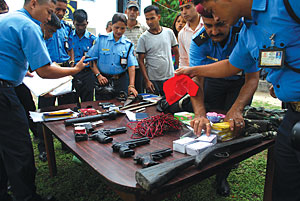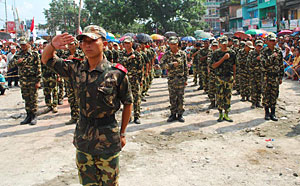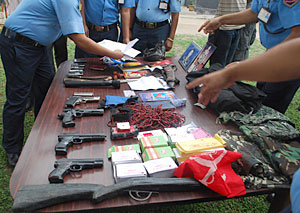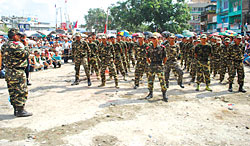 PICS: SITA MADEMBA Police make public weapons recovered from Kirant Workers Party cadres |
Eastern Nepal has seen little respite from strikes called by armed groups following the implementation of the Rs 3.8 billion Special Security Plan (SSP) a year ago. Looting, arson, murder, kidnapping, seizure of property, and extortion is rampant, and people are living in fear.
On 4 May, Kirant Workers Party (KWP) launched a successful attack on a police post in Khotang district. They looted five 303 rifles and one Chinese pistol from Nunthala Police Post, the first such incident since the launch of the SSP. Immediately afterwards, the party torched the offices of Hasposh and Duwagadi VDC of Sunsari district and continued with its forced donation drive. KPWP plans to extort Rs 300,000 a year from each VDC within its sphere of influence, and party president Bibas 'Bidrohi' is candid: "We will be harsh with those who refuse. We will form 'people's governments' in different places and continue our military activities."
VDC secretaries have been leaving villages to take shelter in district headquarters, and feel the government has not done anything for their security. Vice President of the VDC Rights Protection Centre Ram Kumar Yadav claims demands for donations and threats forced them to leave their post. "You can hardly find secretaries in the VDCs now," he says, and not without reason. A bomb was defused recently in the house of Gokarna Prasad Koirala, VDC Secretary of Triyuga Municipality of Udaypur district. The Joint Ethnic Liberation Front claimed responsibility.
 |
The first few months of the SSP looked encouraging. It set up 10 security base camps of the Nepal Police in the eastern Tarai and 13 camps of the Armed Police Force in hilly districts (see box). The KPWP's donation drive, which had caused such havoc in the eastern hills, flagged. Bhisma Prasain, police chief of the eastern region, claims incidents of kidnapping and extortion declined significantly. In 2008/9, he says, there were 268 incidents of kidnapping. This went down to 46 with the introduction of the SSP, and except for a solitary case where ransom was paid, all victims were rescued by the police. Further, murders are down to two this year from thirteen in the previous year, and there have been only 34 strikes called (down from 166 last year).
 |
The regional and ethnic fronts of the east, who are fighting for their own states, have been opposed to the SSP from the very start. Spokesperson of the Khambuwan National Front, Rajan Bantawa, says, "This is a plan to sabotage our movement for liberation." He claims his group is already on a peaceful course to achieve this, but like other groups, their future strategy will depend on how government approaches the issue of security. They want the SSP to be withdrawn. Kumar Lingdel, president of the Democratic National Forum, says, "We have started training Limbuwan volunteers to fight on all fronts. If the government does not address our demand of an autonomous state, we will form a shadow government and even a parallel government."
Businessmen, too, are unhappy with the SSP. "The government has poured billions into the sand in the name of the security plan," says Dharan businessman Sitaram Acharya. "But we don't feel secure, extortion is getting worse, and we are afraid to speak up." General secretary of Sunsari district's Nepal Industries and Commerce Federation, Bijay Shrestha, agrees.
Analyst Kamal Tigela says the SSP is a paper plan, and has not had sustained impact. "The Maoists were the only group during the insurgency, now there are many such groups," he says.
Bhawani Baral, who has been closely studying the ethnic movements in the east, warns, "The SSP could boomerang if ethnic sentiments are not addressed properly. If the ethnic movement is not handled properly, it could lead to communal violence and a separatist movement.
Centre For Investigative Journalism
Armed groups in the eastern hills
 Limbuwan volunteers train in Dharan |
Khambuwan Democratic Front
Federal Limbuwan State Council (Kumar Lingden group)
Federal Limbuwan State Council (Sanju Hang Palungwa group)
Federal Limbuwan State Council (Revolutionary)
Upper Kirant Limbuwan National Forum
Kirant People's Workers Party
Khambuwan Combatant Party
Source: Home Ministry
Special Security Plan
Started: August 2009
Budget: Rs 3,800,100,000
Security base camps: 13
Eastern Tarai districts: 10
Eastern hill districts: 13
Control room vehicle (CRV): 14 (Sunsari, Morang industrial corridor)
Special Security Campaign: Mechi highway
Arms recovered: homemade guns/rifles: 63;
revolvers/pistols: 205; live bullets: 213 rounds
Source: Regional Police Office, Biratnagar
READ ALSO:
How do we get out of this hole?, PUBLISHER'S NOTE
New imbalance, PRASHANT JHA


